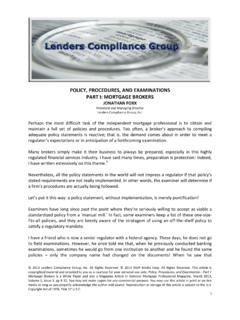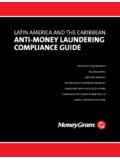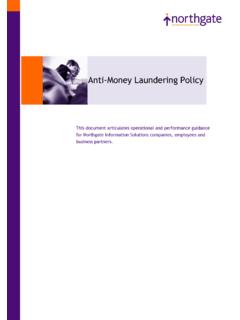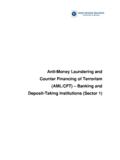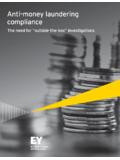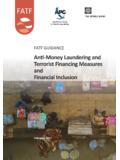Transcription of ANTI-MONEY LAUNDERING DEBUTS FOR NONBANKS
1 MAGAZINE ARTICLE. March 2012. National Mortgage Professional Magazine ANTI-MONEY LAUNDERING . DEBUTS FOR NONBANKS . JONATHAN FOXX *. A new era in filing requirements is about to begin. For the first time, the Financial Crimes Enforcement Network, known as FinCEN, will require nonbank mortgage lenders and originators to implement an ANTI-MONEY LAUNDERING program ( AML Program ) and file Suspicious Activity Reports ( SARs ) for certain loan FinCEN is establishing this AML program in accordance with the Bank Secrecy Act ( BSA ).2 The guidelines relating to the AML requirement become effective on April 16, 2012, and the AML Program's effective compliance date is August 13, The AML program and SAR filing regulations, which I will refer to as FinCEN's rule, are considered to be the first step in an incremental approach to implementation of regulations for the broad loan or finance company category of financial institutions.
2 4. The Bank Secrecy Act defines the term "financial institution" to include, in part, a loan or finance company. This terminology, however, can reasonably be construed to extend to any business entity that makes loans to or finances purchases on behalf of consumers and businesses. Thus, nonbank residential mortgage lenders and originators, and mortgage brokers, are grouped into the "loan or finance company" However, the term loan or finance company'' is actually not concisely defined in any FinCEN regulation, and there is no legislative history on the term itself. Nevertheless, FinCEN is applying this term to extend to any business entity that makes loans to or finances purchases on behalf of consumers and businesses. 6 Therefore, residential mortgage lenders and originators ( RMLOs ) are covered by the scope of the loan or finance company'' term. I will use the acronym RMLO in this article, inasmuch as my principal focus herein relates to residential mortgage lenders and originators.
3 2012 Lenders Compliance Group, Inc. and 2012 NMP Media. All Rights Reserved. This article is published in National Mortgage Professional Magazine, March 2012, Volume 4, Issue 3, pp 40-43. The article ANTI-MONEY LAUNDERING DEBUTS for NONBANKS is copyrighted material. You may not make copies for any commercial purpose. You may freely use this article in print or on-line media as long as you properly acknowledge the author and source. Information contained herein is not intended to be and is not a source of legal advice. Reproduction or storage of this article is subject to the Copyright Act of 1976, Title 17 Page 1 of 15. FinCEN can issue regulations requiring financial institutions to keep records and file reports that are determined to have a high degree of usefulness in criminal, tax, or regulatory investigations or proceedings, or in the conduct of intelligence or counterintelligence activities, including analysis, to protect against international terrorism.
4 Federally regulated depository institutions have been required to have AML Programs,7 and now, as of the aforementioned effective compliance date, RMLOs must also comply with FinCEN's regulations relating to implementing an AML Program and the filing of SARs. Over the last few years,8 FinCEN has issued studies and analyses that used SARs to discover suspected mortgage fraud and money LAUNDERING that involved both banks and residential mortgage lenders and According to FinCEN, these reports underscore[d] the potential benefits of AML and SAR. regulations for a variety of businesses in the primary and secondary residential mortgage markets. 10. Residential mortgage lenders and originators, the RMLOs, are considered to be the primary providers of mortgage finance, and have a unique position with respect to direct contact with the consumer. Thus, they are presumably able to assess and identify money LAUNDERING risks and At this time, FinCEN.
5 Is not proposing a definition of loan or finance company'' that would encompass other types of consumer or commercial finance companies, or real estate agents and other entities involved in real estate closings and settlements. In this article, I am going to unpack the AML Program for you in a way that will give you some familiarity with its scope, while perhaps also making its implementation a bit less daunting than it might otherwise seem to be. Nevertheless, many RMLOs will find that setting up the AML Program will be a challenging endeavor. Information, issuances, and relevant documentation are available in the FinCEN section of my firm's website Library at Please keep in mind that, as is the case with many applications of legal and regulatory compliance, there are aspects and nuances that will require recourse to a competent risk management professional to obtain comprehensive guidance and reliable AML PROGRAM.
6 Residential mortgage lenders and originators, the RMLOs, are required to establish an AML Program that includes, at a minimum: (1) Development of internal policies, procedures, and controls. (2) Designation of a compliance officer. 2012 Lenders Compliance Group, Inc. and 2012 NMP Media. All Rights Reserved. This article is published in National Mortgage Professional Magazine, March 2012, Volume 4, Issue 3, pp 40-43. The article ANTI-MONEY LAUNDERING DEBUTS for NONBANKS is copyrighted material. You may not make copies for any commercial purpose. You may freely use this article in print or on-line media as long as you properly acknowledge the author and source. Information contained herein is not intended to be and is not a source of legal advice. Reproduction or storage of this article is subject to the Copyright Act of 1976, Title 17 Page 2 of 15. (3) Ongoing employee training program. (4) Independent audit function to test for compliance.
7 To effectuate the AML Program, FinCEN has given a definition of an RMLO that is broad in scope and covers most nonbank residential mortgage originators. The AML Program covers any business that, on behalf of one or more lenders, accepts a completed mortgage loan application, even if the business does not in any manner engage in negotiating the terms of a loan. Also covered are businesses that offer or negotiate specific loan terms on behalf of either a lender or borrower, regardless of whether they also accept a mortgage loan application. Note that the word accept is intended to differentiate the FinCEN rule from the SAFE Act. FinCEN is ensuring that persons who either accept an application or offer or negotiate the terms of a loan are covered. Furthermore, the AML rule applies to residential mortgage originators, regardless of whether they receive compensation or gain for acting in that capacity. Obviously, these changes create differences between the definitions in the FinCEN rule and those used in the SAFE Act and other federal mortgage-related statutes.
8 Clearly, this was done intentionally to differentiate the FinCEN requirements from those other statutes, so that FinCEN's interpretation is not based on the interpretation of those Moreover, FinCEN has taken the position that the registration and training requirements under the SAFE Act are not sufficient to address all of the concerns and accomplish all of the goals related to AML and SAR programs. In any event, FinCEN has announced that it intends to dialogue with the Conference of State Bank Supervisors ( CSBS ) to coordinate the identification and examination of mortgage originators subject to FinCEN's The AML Program applies to businesses, including sole proprietorships, but does not contemplate coverage of an individual employed by a financial To state this precisely: FinCEN's rule does not incorporate any exceptions for businesses based on their form of organization. There are no exceptions for a certain arbitrary number of employees or net worth, nor is there a small business exclusion or exception for businesses with fewer than five employees, or for businesses that satisfy some other arbitrary size, net worth or similar criteria.
9 Similarly, there is no de minimis . exception for businesses that lend or broker loans under a relatively low value, or low aggregate volume of transactions within a set time period. The only exclusion is given to individuals financing the sale of their own real estate. 2012 Lenders Compliance Group, Inc. and 2012 NMP Media. All Rights Reserved. This article is published in National Mortgage Professional Magazine, March 2012, Volume 4, Issue 3, pp 40-43. The article ANTI-MONEY LAUNDERING DEBUTS for NONBANKS is copyrighted material. You may not make copies for any commercial purpose. You may freely use this article in print or on-line media as long as you properly acknowledge the author and source. Information contained herein is not intended to be and is not a source of legal advice. Reproduction or storage of this article is subject to the Copyright Act of 1976, Title 17 Page 3 of 15. Generally, purchase money mortgage loans and traditional refinancing transactions facilitated by RMLOs are covered in the AML Program.
10 Yet, because any transactions conducted by the RMLO could reasonably be considered to be extending a residential mortgage loan or offering or negotiating the terms of a residential mortgage loan, within the meaning of the definitions of residential mortgage lender'' and residential mortgage originator,'' as provided in FinCEN's rule, the AML Program would seem to apply to transactions involving funds or programs under the Troubled Asset Relief Program and similar Federal programs, or any similar state housing authority or housing assistance program. However, to the contrary, FinCEN's rule does not directly apply to the Federal or state housing authorities and agencies administering such programs. Therefore, excluded from the AML Program is any Federal or state agency or authority administering mortgage or housing assistance, fraud prevention or foreclosure prevention program, though RMLOs participating in such programs must comply with FinCEN's rule to the extent that any transactions could reasonably be considered to be extending a residential mortgage loan or offering or negotiating the terms of a residential mortgage Interestingly, the AML Program does apply to foreclosure prevention actions and counseling services performed by legitimate, non-profit organizations, to the extent any such organizations may reasonably be deemed to be extending a residential mortgage loan (including a short-term mortgage loan), or offering or negotiating the terms of a residential mortgage loan.

